Tue 16 Jul 2019

At one stage in my career I was responsible for executive recruitment. An exec wanting a PA came into my office. It was 'not my job', but being me, I just asked the job description, essential skills, etc.
The response I got was something along the lines of, “She’ll probably be a graduate as I need someone intelligent. Degree not that important, well perhaps physics or technology but she must speak well and must look the part.”
So, he did not want a male PA, and I could guess at what he meant by 'must look the part'. I wondered why.
Did the sex of an appropriate candidate matter or was it a biased view? Knowing something of his department a firm grasp of the appropriate technology was essential, as was a broad-based understanding of the business.
Research released by the Chartered Management Institute and XpertHR reveals female graduates are more likely to work in a slightly lower skilled occupation group than men. Men make up the majority of workers in the top 10% of earners for all employees. So why am I writing this in an article intended for L&D professionals?
We stand on the brink of a technological revolution that will fundamentally alter the way we live, work, and relate to one another in scale, scope, and complexity.
You may have noticed that industry globally is in a state of revolution. We stand on the brink of a technological revolution that will fundamentally alter the way we live, work, and relate to one another in scale, scope, and complexity. The transformation will be unlike anything humankind has experienced before.
We do not yet know how it will unfold, but the response must be integrated and comprehensive, involving all stakeholders of the global polity, from the public and private sectors to academia and civil society.
Core to such a change is learning. You are the experts in learning - any change, any advance, from technological advance to shifts in behaviour related to interpersonal communication, leadership, organisation change and variations nobody has yet considered requires learning.
Senior executives have started to realise L&D is the crucial shift that will advance their organisation in this changing world. Historical norms and values are dying. Learning is essential and what has just been learned will change. The future core function is learning facilitation.
People are the core, but those people must learn new ways of thinking about what they are facing. Politicians, executives, workers cannot rely on history. Things that seem correct a short while ago are changing. You must think differently, creatively.
Your time is coming, and operations in this new and changing environment will rely on you to help them learn and apply that learning of skills, knowledge and attitudes that will take the organisation forward.
Am I a revolutionary? No. I am just a person who has spent most of his life in businesses of changing technology, changing attitudes, changing behaviours and changing knowledge. You are the future so get learning. This example of sexual discrimination demonstrates we need to change.
About the author
Barry Johnson BA, CMCIPD, MCMI, is a non-executive director at Learning Partners Ltd.
View all news